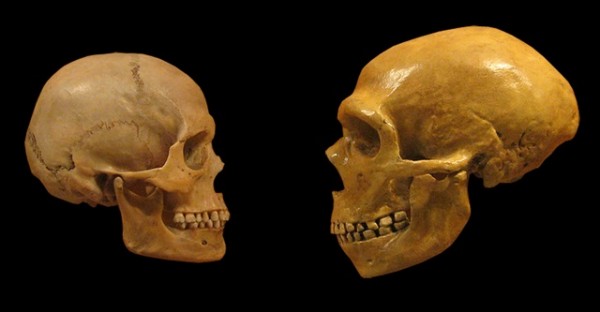By Ana Verayo, | February 26, 2017

Comparison of Modern Human and Neanderthal skulls from the Cleveland Museum of Natural History. (hairymuseummatt/CC BY-SA 2.0)
Scientists have revealed how important Neanderthal DNA is to modern humans, providing evidence of a crucial genetic footprint that can still be seen in modern humans. Scientists say that although Neanderthals disappeared 40,000 years ago, their genetic imprint is still embedded in all of us today.
Like Us on Facebook
More specifically, the researchers provided evidence that Neanderthal DNA sequences have a great influence on the gene expression of modern humans and can affect traits such as height and mental health problems. Prior research showed that around two percent of the modern human genome is composed of Neanderthal DNA.
According to the co-author of the study, Joshua Akey of the University of Washington School of Medicine, the last modern human and Neanderthal mating occurred 50,000 years ago. However, there are still measurable Neanderthal impacts on modern gene expression. These gene expression variations contribute to human phenotypic variation and susceptibility to disease.
For this new study, researchers examined individuals who inherited both Neanderthal and modern day human alleles on any given gene, to study the impact of Neanderthal DNA on gene expression. The researchers studied 214 individuals with these alleles and compared their gene expression for 52 different tissues.
"We have detected a difference in gene expression between the Neanderthal and modern human allele in 25 percent of those we tested," the lead author of the study, Rajiv McCoy from the University of Washington, said.
More specifically, researchers found that the gene called ADAMTSL3, which is also known for adding risk to schizophrenia, is also linked to height. The organs that possess the lowest level of Neanderthal allele expression are the brain and the testes, suggesting that these organs have evolved rapidly since modern humans separated from Neanderthals.
Past studies proved that Neanderthal genes have contributed to depression, metabolism, and even lupus risk, but this is the first study to identify the mechanism behind this Neanderthal genetic link and modern day human traits.
This new study was published in the journal Cell.
-
Use of Coronavirus Pandemic Drones Raises Privacy Concerns: Drones Spread Fear, Local Officials Say

-
Coronavirus Hampers The Delivery Of Lockheed Martin F-35 Stealth Fighters For 2020

-
Instagram Speeds Up Plans to Add Account Memorialization Feature Due to COVID-19 Deaths

-
NASA: Perseverance Plans to Bring 'Mars Rock' to Earth in 2031

-
600 Dead And 3,000 In The Hospital as Iranians Believed Drinking High-Concentrations of Alcohol Can Cure The Coronavirus

-
600 Dead And 3,000 In The Hospital as Iranians Believed Drinking High-Concentrations of Alcohol Can Cure The Coronavirus

-
COVID-19: Doctors, Nurses Use Virtual Reality to Learn New Skills in Treating Coronavirus Patients







